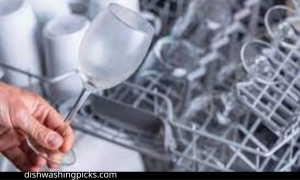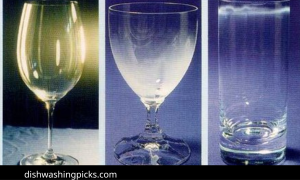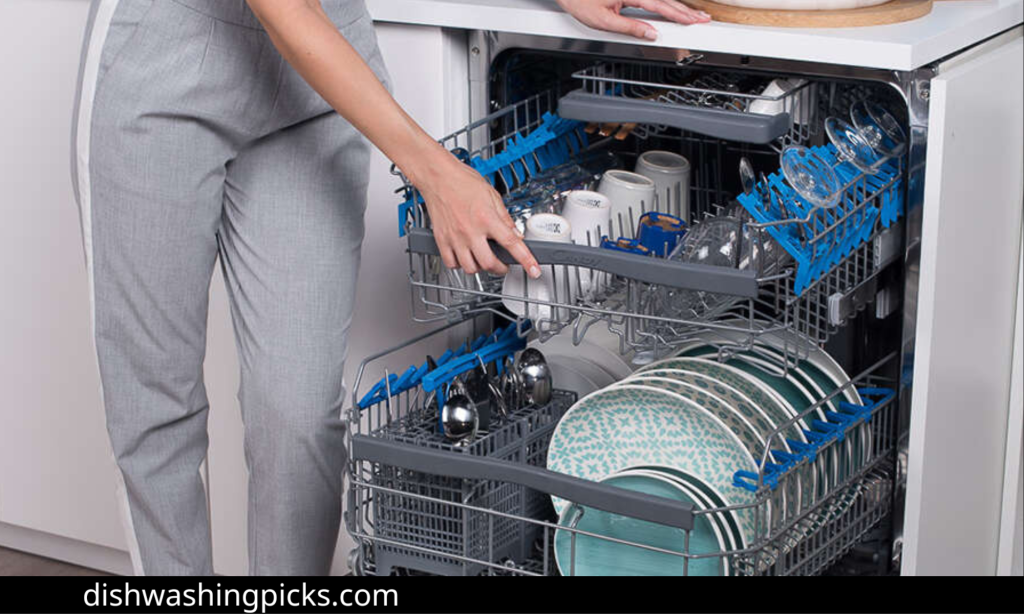You load your dishwasher with clear glasses, only to find them marred by a hazy film after the cycle is complete. It’s like a veil that obscures the brilliance of your glassware, leaving you with a sense of disappointment, This article isn’t just about solving a problem; it’s about preserving how to prevent cloudy glasses in the dishwasher.
How to prevent cloudy glasses in the dishwasher
We’ll explore practical steps to prevent cloudy glasses in your dishwasher, ensuring that your table remains a canvas for beautiful moments, where the clinking of glasses signifies joy and togetherness, unmarred by cloudiness.
Common reasons for glassware cloudiness

How to prevent cloudy glasses in dishwasher preventing cloudy glasses is within your reach. It’s a practical endeavor that doesn’t require magic, just a few simple steps to ensure that your glassware remains as clear and inviting as your expectations:
Proper Loading Techniques
Much like organizing a group photo, proper loading is the key. Ensure that glasses are spaced apart and placed upside down. This allows for optimal water flow and detergent distribution, preventing spots and cloudiness.
Adjust Your Rinse Aid Settings
Rinse aid is the primary agent against cloudy glasses, so you have to check your dishwasher’s rinse aid settings and ensure that it’s correctly adjusted. A well-balanced rinse aid level helps to prevent spots and enhance glass clarity.
Best drinking glasses for dishwasher (Best 7 suggestions)
Choose the Right Detergent
Consider your choice of detergent as selecting the right tool for the job. Make sure your detergent is suitable for your water hardness level.
Maintain a Suitable Water Temperature
Water temperature plays a crucial role in achieving spotless glassware. Aim for a water temperature of around 140°F (60°C). Water that’s too hot can bake mineral residues onto your glass surfaces, while water that’s too cold may not rinse away detergent effectively.
Keep Your Dishwasher Clean
Your dishwasher can accumulate residue and mineral deposits, which can be redeposited onto your glassware during wash cycles. To get rid of this, you need to know how to prevent cloudy glasses in the dishwasher. Clean your dishwasher periodically to prevent this.
Monitor Water Hardness
Understanding your water hardness level is essential. If you have hard water, consider using a water softener or specialized dishwasher detergent to combat mineral deposits that lead to cloudiness.
By following these practical steps, you’re not just preventing cloudiness; you’re preserving the elegance of your dining experience.
It’s an act of care and consideration, ensuring that the clinking of glasses at your table signifies joy, togetherness, and the simple pleasure of shared moments.
Choosing the Best Air Gap for Dishwasher
Consult Your Dishwasher Manual
Much like following a trusted family recipe, consult your dishwasher’s manual so you know how to prevent cloudy glasses in the dishwasher.
It often contains valuable information about the best detergent and rinse aid to use based on your water’s hardness.
Dishwasher manufacturers design their machines with specific recommendations in mind.
Mindful Refilling
Much like replenishing a beloved ingredient in your kitchen, remember to refill the rinse aid reservoir regularly.
Keeping it well-stocked ensures consistent results, including spotless, clear glassware.
With these steps, you’re not just choosing detergents and rinse aids; you’re setting the stage for a dining experience that’s nothing short of enchanting.
It’s an act of care, ensuring that your table is a canvas for beautiful moments, where every toast and shared laughter is underscored by the brilliance of crystal-clear glassware.
The importance of water temperature
Your dishwasher stands ready to assist, promising sparkling clean dishes, including your cherished glassware.
But what’s often overlooked in this culinary symphony is the role of water temperature:
Understanding the Role of Water Temperature
So you need to now think of water temperature as the foundation of a well-cooked meal. In your dishwasher, it’s the key to achieving spotless, cloud-free glassware.
Hot water dissolves detergent efficiently, ensures thorough rinsing, and aids in removing food residues and mineral deposits.
Finding the Optimal Temperature
Much like finding the right flame under your cooking pot, the optimal water temperature for dishwashing is around 140°F (60°C).
This temperature allows the detergent to work its magic, while the hot water rinses away any lingering residues, leaving your glassware crystal clear.
Adjusting Your Water Heater
Your dishwasher relies on the water heater to provide the appropriate temperature.
Check your water heater settings and ensure it’s configured to deliver hot water at the desired temperature.
This small adjustment can make a significant difference in the quality of your dishwashing results.
Running the Hot Water Beforehand
Much like preheating your oven, it’s a good practice to run your kitchen faucet with hot water before starting the dishwasher. This flushes out any cold water from the pipes and ensures that your dishwasher begins the cycle with hot water right away.
Why is my dishwasher making my glasses cloudy?
Cloudy glasses coming out of the dishwasher is a common issue and can be caused by several factors. Cloudiness on glassware is often due to mineral deposits, which can occur for the following reasons:
Incorrect Detergent or Rinse Aid
Using the wrong dishwasher detergent or failing to use rinse aid can contribute to cloudiness on glassware. Proper detergent and rinse aids help in preventing mineral deposits and promote effective rinsing.
Here are some steps you can take to reduce or eliminate cloudiness on your glassware:

Use Rinse Aid
Make sure your dishwasher is equipped with a rinse aid dispenser, and use a rinse aid specifically designed for dishwashers. Rinse aid helps prevent mineral buildup and ensures water sheeting action, which leads to cleaner, spot-free dishes.
Choose a Quality Dishwasher Detergent
Use a high-quality dishwasher detergent that is designed to work well in hard water conditions. Look for detergents that contain a water-softening agent.
Regularly Clean the Dishwasher
Clean the dishwasher’s interior, including the spray arms, filter (if applicable), and the interior walls, to remove any buildup of mineral deposits and detergent residue. Follow the manufacturer’s recommendations for cleaning.
Best and most effective dishwasher detergent for grease ever
Ensure that the hot water supply to your dishwasher is at the recommended temperature (usually around 120°F or 49°C) to help the detergent work effectively.
Load the Dishwasher Properly
Avoid overcrowding the dishwasher, as this can prevent proper water circulation. Make sure that glassware is spaced apart to allow water to reach all surfaces.
Pre-rinse Dishes
While it’s not always necessary, rinsing dishes before placing them in the dishwasher can help reduce the amount of food particles and minerals that contribute to cloudiness.
Use Vinegar
If your glasses are already cloudy due to mineral deposits, you can soak them in a mixture of white vinegar and water. Place the glasses in the mixture and let them soak for a while, then rinse and wash them again in the dishwasher.
Remember that some glassware may have etching (tiny, permanent scratches) due to high mineral content in hard water, and this cannot be reversed. However, by following these steps, you can help prevent and reduce cloudiness on your glassware and keep them looking clear and sparkling.
How do you remove crystals from glasses?
If you have crystal glassware, it’s important to handle it with care to avoid damage. If you notice crystals (cloudy or hazy spots) on your crystal glasses, these spots are often due to hard water mineral deposits, and you can try the following methods to remove them:
Vinegar Soak:
Fill a container or sink with equal parts of white vinegar and warm water.
Submerge the cloudy crystal glasses in the vinegar-water solution.
Allow the glasses to soak for several hours or overnight.
Gently scrub the cloudy areas with a soft cloth or a soft-bristle brush.
Rinse the glasses with clean water and dry them with a soft, lint-free cloth.
Baking Soda Paste:
Apply the paste to the cloudy spots on the crystal glasses.
Gently rub the paste onto the spots with a soft cloth or a soft bristle brush.
Rinse the glasses with clean water and dry them with a soft, lint-free cloth.
Commercial Crystal Cleaner:
You can purchase a commercial crystal cleaner designed to remove cloudiness and mineral deposits. Follow the manufacturer’s instructions for use.
Lemon Juice and Salt:
Apply the paste to the cloudy areas on the crystal glasses.
Gently rub the paste onto the spots with a soft cloth or a soft bristle brush.
Rinse the glasses with clean water and dry them with a soft, lint-free cloth.
Denture Tablets:
Dissolve a denture-cleaning tablet in a container of warm water.
Submerge the crystal glasses in the solution and let them soak for a few hours.
Gently scrub the cloudy areas with a soft cloth or brush.
Rinse the glasses with clean water and dry them with a soft, lint-free cloth.
Remember to be gentle when cleaning crystal glasses, as they can be fragile and easily scratched. Avoid abrasive cleaners and scouring pads, as they can damage the glass. After cleaning, inspect the glassware for any remaining spots and repeat the cleaning process if necessary.
To prevent future cloudiness, it’s also a good idea to use rinse aid in your dishwasher, use a high-quality dishwasher detergent, and ensure your dishwasher is set to the appropriate water temperature to minimize mineral deposits on your crystal glassware.
Conclusion
By understanding the importance of water temperature and following these practical steps, you’re not just ensuring the cleanliness of your glassware; you’re elevating the entire dining experience. Ensuring that every meal prepared in your kitchen is served with love, surrounded by the sparkle of crystal-clear glassware.

